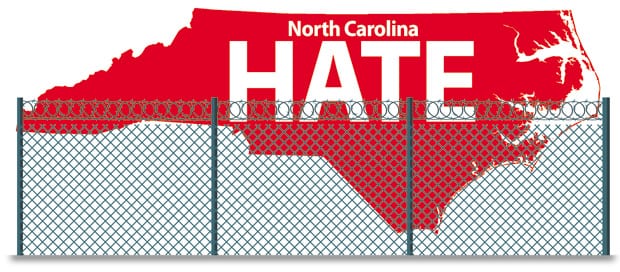A Texas version of North Carolina’s notorious HB2 could prove to be an even greater economic disaster

 North Carolina dug in its heels and settled in for the long term this week. The legislature’s action — refusing to repeal HB2 in the face of a disastrous economic boycott and at the same time reneging on a deal with the city of Charlotte — means the state will remain a pariah for the foreseeable future.
North Carolina dug in its heels and settled in for the long term this week. The legislature’s action — refusing to repeal HB2 in the face of a disastrous economic boycott and at the same time reneging on a deal with the city of Charlotte — means the state will remain a pariah for the foreseeable future.
Earlier this week, political leaders in the Tar Heel State struck a deal: The Charlotte City Council would repeal its nondiscrimination ordinance protecting the LGBT community — the ordinance that prompted the anti-LGBT lawmakers to pass HB2 and that began the national discussion on whether transgender people have a right to pee. In exchange, the General Assembly would repeal HB2.
Those negotiating the repeal of both the ordinance and the law — including Democratic Governor-elect Roy Cooper — were calling it a reset. Everything would go back to the way it was before and everybody would be happy (except for the people who were being discriminated against, of course).
But with a reset, companies would again invest in North Carolina. Jobs that have been moved elsewhere would begin to return. Concerts that have been canceled would be rescheduled. Sports events would come back to the state. Travel bans would be canceled.
North Carolina would get back on track.
So the Charlotte City Council repealed its ordinance on Monday. But then the state Senate balked; What if they repealed HB2 and Charlotte turned around and re-instated its ordinance?
Hatred of LGBT people is obviously a value that’s worth investing quite a bit of money to keep in place.
Keeping HB2 in place means businesses will continue to expand elsewhere. Jobs will be moved out of state. Concerts and sports events will be canceled or moved in other states. Travel will be diverted to other places.
Just last week, Dallas benefited from the North Carolina boycott. New York banned state travel to North Carolina because of HB2. That includes its state universities.
So when a game against Duke in North Carolina was canceled, the University at Albany scheduled a first-ever game with SMU.
Not only the team, but coaches, athletic staff and development office personnel traveled to Dallas rather than Charlotte. So did alumni from around the state to see the game. All that brought Dallas revenue for hotels, rental cars and restaurants, plus a large catered reception at a venue at Mockingbird Station and drinks at a local bar after the game.
Why does this matter so much to us here in Dallas? Because more than 100 anti-LGBT bills have been filed in the Texas Legislature for the upcoming session. Some of those bills would directly target transgender people and affect their ability to simply go to the bathroom. And not being able to use a public bathroom affects a person’s ability to go to work and earn a living.
Some of those bills would target cities and restrict local control. Dallas, Fort Worth, Austin, San Antonio, Plano and El Paso protect their local LGBT citizens.
Houston doesn’t. Cities such as Mesquite and Grand Prairie protect their LGBT employees. Houston doesn’t. While we’re happy with our ordinances, we have no interest in telling Houston what it should do. What works in Dallas might not work in Midland.
The legislature, however, will likely spend quite a bit of the upcoming session dealing with the policy of where trans people can pee statewide. They’ll consider whether some cities can do things other cities have decided not to do.
What the legislature won’t be spending much time doing is figuring out how to improve Texas public education. They won’t be working on funding to fix crumbling bridges. They certainly won’t do anything to protect the public from the zika virus or other public health threats. Those will be left to local governments. (Remember the Ebola crisis? Dallas city and county officials were forced to handle it without any state help).
We might not win the battle by arguing that legislating discrimination is simply wrong. We may, however, win the economic argument.
I’d love to see Albany return to play SMU again next year. That won’t happen if Texas passes its own version of HB2 and New York bans travel to Texas.
HB2 has been bad business for North Carolina. For Texas, similar legislation will be an even larger economic disaster.
This article appeared in the Dallas Voice print edition December 30, 2016.











